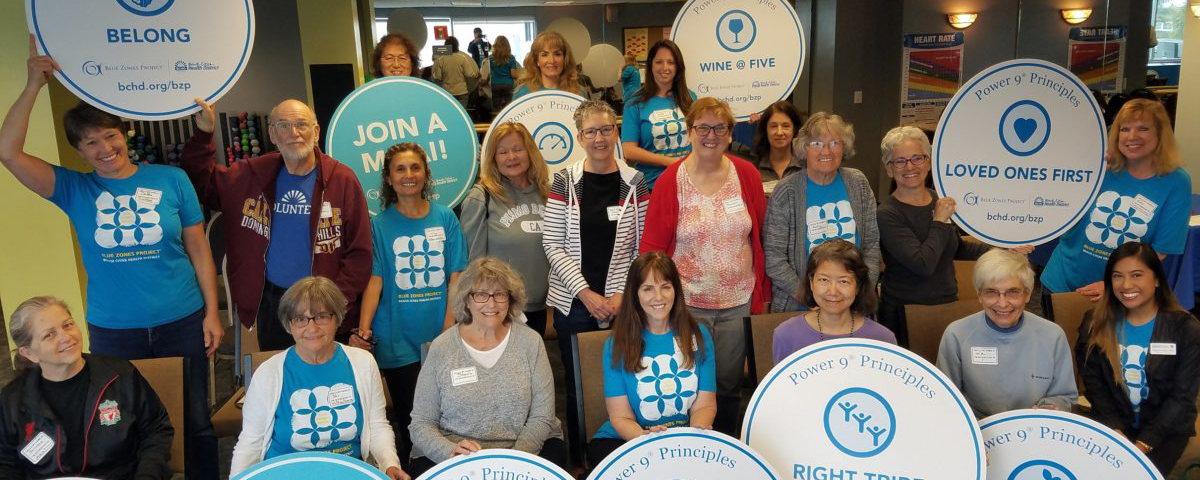By Lauren Nakano, Director, Blue Zones Project, BCHD
If you think about the paradigm of our lives right now, it’s confusing. As humans we are innately wired for social connection; science has proved our health and well-being depend on it. At the same time in this unprecedented pandemic, our health and well-being are also contingent on our ability and willingness to socially distance.
Before the pandemic our communities and the Nation were struggling. The year 2017 was the first time no state in the nation saw an improvement in well-being, according to Gallup. Loneliness and social isolation can be as damaging to health as smoking 15 cigarettes a day, according to the U.S. Health Resources & Services Administration (HRSA). Loneliness does not discriminate, and it can appear as anger, alienation, sadness and a host of distressing emotional states. Although loneliness is more likely in populations who are at risk for social alienation, isolation, and separation, anyone can feel lonely at any time. This includes college-aged young adults, care givers and stigmatized groups.
We are in a paradigm shift – searching for the “next normal.” It’s difficult to accept that things may not go back to normal. Re-establishing the culture and traditions of our families, our communities, across the nation and around the globe is of the utmost importance. The good news is that it’s a time where many people are elevating their voices, not sitting in silence anymore and are ready to make a difference. Here are four things you can do to connect, heal and contribute to the collective solution:
Find purpose and meaning: one of the secrets to happiness and remedies to loneliness is knowing why you get up in the morning. Richard Leider, author of The Power of Purpose, says people who live with a sense of purpose can live up to seven years longer than those who don’t and finding your purpose is not as complicated as it might seem. Identify your gifts, passions and values. Then incorporate ways to put these skills into action in ways that add meaning to your life and the lives of others. Beach Cities Health District’s Purpose Moais can guide you to discover your gifts, passions and values.
Be of service: Being of service heals the trauma of loneliness, according to Dr. Vivek Murthy, 19th U.S. Surgeon General, whose book, Together: The Healing Power of Human Connection in a Sometimes Lonely World, suggests that helping others makes us feel we matter and mattering feels good. What doesn’t matter so much is the specific type of service performed as long as it feels genuinely and personally meaningful. Volunteer opportunities are abundant in the Beach Cities and easily enable residents to be of service.
Find solitude: Solitude protects against loneliness. Loneliness is when someone feels that something is missing. Solitude is a state of being alone without being lonely. Finding solitude can result in a sense of peace, freeing the mind from distractions and enhancing creativity. Busyness with our lives or jobs often makes it difficult to turn off the noise long enough to regroup, recharge and re-center ourselves. Mindfulness, or taking time to meditate, downshift and leading from the inside out instead of being pressured from the outside in, can have positive and meaningful effects on relationships, careers and productivity.
Connection before Agreement: In Dr. Murthy’s book, Together, being connected to others gives us a stake in more than our own interests and expands our interests to include our whole community and thus increases our motivation to work together. In contrast, the absence of connection leads to loneliness and less civic engagement. The nation and our communities are entrenched in conflicts that in some cases are tearing our society apart. The way to find common ground and solutions to seemingly overwhelming problems is by:
- Seeing how quickly you can find one thing you have in common with someone who appears to be very different or has a differing point of view.
- Deeply [Compassionately] listening. Remember, your job is not to fix, challenge, correct or interrupt.
- Building trust so all involved know it’s a safe space to share their perspectives and stories. The power of personal stories should not be underestimated because in sharing stories, complex issues are humanized, people feel heard and communities can heal.
Throughout this pandemic everyone has been forced to change how they live and interact with others. The pace with which we get through this challenging time is contingent upon the actions of each resident. Finding creative, new and out-of-the-box ideas for sustaining our social connections is more important than ever because it is critical to our health and well-being and because we are better together.




